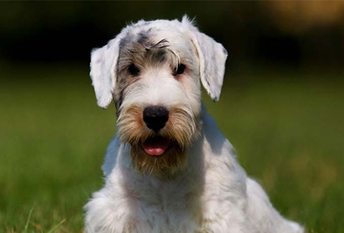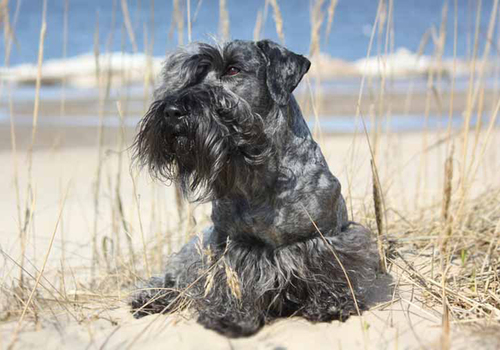The Cesky is a coated breed, so don’t get one if you’re not willing to put in time for grooming. Cesky puppies need daily grooming, and adults must be brushed once or twice a week. To maintain its appearance, the coat must be trimmed every four to six weeks. You’ll also want to clean your dog's beard after he eats or drinks. You can have him groomed professionally or learn to do it yourself.
Check the ears on a weekly basis for signs of infection, irritation, or wax build up. Cleanse regularly with a veterinarian-approved cleanser and cotton ball. Brush the teeth at least once per week to prevent tartar buildup and fight gum disease. Additionally, nails should be trimmed once per month if the dog does not wear down the toenails naturally.
The Cesky Terrier enjoys running and playing through a wooded area or open countryside. It also needs a long daily walk on or off the lead, but always in a safe area. They are small but will make a fairly good jogging companion. Ceskys have an average demand for exercise.
With this said, Cesky Terrier puppies should not be given too much exercise because their joints and bones are still growing and too much pressure on them could result in causing a dog a few problems later on in their lives. They should not be allowed to jump up or off furniture nor should they be allowed to run up and down the stairs because this puts too much pressure on their still growing joints and limbs.
If you get a Cesky puppy from a breeder, they would give you a feeding schedule and it's important to stick to the same routine, feeding the same puppy food to avoid any tummy upsets. You can change a puppy's diet, but this needs to be done very gradually always making sure they don't develop any digestive upsets and if they do, it's best to put them back on their original diet and to discuss things with the vet before attempting to change it again.
Older dogs are not known to be fussy or finicky eaters, but this does not mean you can feed them a lower quality diet. It's best to feed a mature dog twice a day, once in the morning and then again in the evening, making sure it's good quality food that meets all their nutritional requirements. It's also important that dogs be given the right amount of exercise so they burn off any excess calories or they might gain too much weight which can lead to all sorts of health issues. Obesity can shorten a dog's life by several years so it's important to keep an eye on their waistline from the word go.
Learn about which human foods are safe for dogs, and which are not. Check with your vet if you have any concerns about your dog’s weight or diet. Clean, fresh water should be available at all times. Like many large breeds, Saint Bernard can experience bloat, a life-threatening condition where the stomach distends and twists. The causes of bloat aren’t fully understood, but experts agree that multiple, small meals per day and preventing vigorous exercise around mealtimes may help reduce the chances of it happening.
Cesky Terriers on average live between 12 and 15 years. Breed health predispositions may include hip dysplasia and a metabolic disorder known as Scottie Cramp or Wobbly Scottie.
The Cesky Terrier is considered to be a little less stubborn and thus more easily trainable than some other terrier breeds. They still require a firm hand in a kid glove. They will shut down if faced with negative or harsh training methods, so exercise only a positive, reward-based approach to training.
Cesky Terriers are extremely intelligent, sensible, and feisty, which makes them a good candidate for training for dog sports. They have a very high prey drive, however, which should be squelched from the beginning.
Puppies should be properly socialized to develop the amiable, outgoing personality that is characteristic of the breed. They’re successful in performance and companion events such as earthdog, barn hunt, obedience, and agility.












